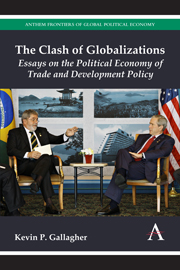Book contents
- Frontmatter
- Dedication
- Contents
- Preface and Acknowledgments
- List of Tables, Figures and Boxes
- Chapter 1 Introducing the Clash of Globalizations
- Chapter 2 Losing Control: Policy Space to Regulate Cross-Border Financial Flows
- Chapter 3 The New Vulture Culture: Sovereign Debt Restructuring and International Investment Rules
- Chapter 4 Whither the Developmental State? Industrial Policy and Development Sovereignty
- Chapter 5 Understanding Developing Country Resistance to the Doha Round
- Chapter 6 Trading Away the Ladder? Trade Politics and Economic Development in the Americas
- Chapter 7 Putting Development First: Trade Policy for the Twenty-first Century
- References
- Index
Chapter 6 - Trading Away the Ladder? Trade Politics and Economic Development in the Americas
Published online by Cambridge University Press: 05 September 2013
- Frontmatter
- Dedication
- Contents
- Preface and Acknowledgments
- List of Tables, Figures and Boxes
- Chapter 1 Introducing the Clash of Globalizations
- Chapter 2 Losing Control: Policy Space to Regulate Cross-Border Financial Flows
- Chapter 3 The New Vulture Culture: Sovereign Debt Restructuring and International Investment Rules
- Chapter 4 Whither the Developmental State? Industrial Policy and Development Sovereignty
- Chapter 5 Understanding Developing Country Resistance to the Doha Round
- Chapter 6 Trading Away the Ladder? Trade Politics and Economic Development in the Americas
- Chapter 7 Putting Development First: Trade Policy for the Twenty-first Century
- References
- Index
Summary
Over the past 20 years many nations from Latin America and the Caribbean (LAC) have signed and ratified free trade agreements with the United States. These agreements lock-in and expand the preferential access to the US market that LAC nations have enjoyed for some time. In exchange for preferential access to the largest economy in the world, LAC nations have agreed to provisions regarding financial services, intellectual property and foreign investment, and beyond that go far “deeper” than commitments under the World Trade Organization. This chapter builds on previous work (Gallagher 2008a; Gallagher and Thrasher 2010) and draws heavily from the deep insights of other scholars, especially Kenneth Shadlen of the London School of Economics (Shadlen 2006, 2008) to examine the extent to which those deeper commitments curtail the ability of LAC nations to deploy adequate policies to diversify their economies for development.
The first section of the chapter presents a theoretical framework regarding the political economy of signing US-style free trade agreements from a development perspective. Section two examines the extent to which recent treaties impact the ability of nations to deploy countercyclical and monetary policies. Section three discusses the extent to which these treaties grant sufficient policy space for industrial development. The final section summarizes the main arguments of the chapter and raises some political economy questions regarding why LAC nations are willing to forego so much more policy space than those same nations are willing to accept at the WTO.
- Type
- Chapter
- Information
- The Clash of GlobalizationsEssays on the Political Economy of Trade and Development Policy, pp. 117 - 140Publisher: Anthem PressPrint publication year: 2013

